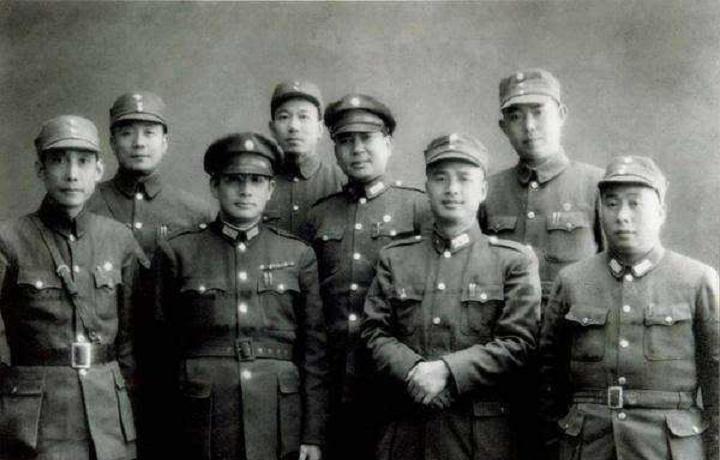In May 1947, the Battle of Menglianggu, which was of great significance to the direction of the situation in the Liberation War, was opened. The nationalist reorganized 74th Division, led by Zhang Lingfu, was ordered to attack the Tanbu front from the north of Duozhuang. On the one hand, our army organized troops to carry out frontal blockade, and on the other hand, seized the opportunity of the battlefield, divided the troops and encircled them in a roundabout way, and finally successfully cut off the contact between the reorganized 74th Division and the reorganized 25th Division, the reorganized 83rd Division, and other neighboring units, and surrounded the reorganized 74th Division heavily in the Menglianggu area, and then completely annihilated it.

The reorganized 74th Division was the product of the reorganization of the Kuomintang army in 1946 under the guise of "disarmament", and its predecessor was the 74th Army, which was formed during the War of Resistance Against Japanese Aggression. On the surface, from the 74th Army to the integrated 74th Division, the size of the unit seems to have shrunk, but in fact, it is not, this is just a word game played by the Kuomintang army, and after the establishment of the reorganized 74th Division, its strength and weapons and equipment have not only not been reduced, but have been greatly expanded. At that time, the reorganized 74th Division was also together with the newly organized 1st Army, the 5th Army, the newly organized 6th Army, and the 18th Army (the reorganized 11th Division), and was called the five ace main forces of the Kuomintang Army.
In the Battle of Menglianggu, our army successfully annihilated the reorganized 74th Division, which not only greatly reversed the situation on the battlefield in Shandong, but also gave a great shock to the Kuomintang army, because the reorganized 74th Division was the first unit to be annihilated by our army among the five ace main forces. At that time, many senior generals of the reorganized 74th Division, including division commander Zhang Lingfu, deputy division commander Cai Renjie and others, all died on Meng Lianggu, and the ending was regrettable. Wei Zhenyu, who served as the chief of staff of the reorganized 74th Division, was somewhat different, he did not choose to accompany the Chiang family dynasty to the funeral, but became a prisoner of our army. So, what kind of encounter did Wei Zhenyu have after he was captured? How did he end up?
Wei Zhenyu was a native of Changsha, Hunan Province, and in his early years he had successively studied in the 22nd Engineering Section of the Japanese Army Non-Commissioned Officer School and the 16th Session of the Kuomintang Army University, which can be regarded as one of the few academic factions among the Kuomintang generals. During the period of the All-out War of Resistance Against Japanese Aggression, Wei Zhenyu had been engaged in military staff work and had certain military theoretical knowledge and ability. In May 1946, when the Nationalist 74th Army was reorganized into the integrated 74th Division, Wei Zhenyu was appointed chief of staff of the reorganized 74th Division. What should be said here is that before Wei Zhenyu became the chief of staff of the reorganized 74th Division, he did not hold a position in the 74th Army system, and in today's terms, he is an airborne cadre, unlike Zhang Lingfu and others who have served in the 74th Army system for a long time.
Based on the above situation, when Wei Zhenyu was the chief of staff of the reorganized 74th Division, the relationship with the division commander Zhang Lingfu was a little delicate, although there was no contradiction, but it was just a simple colleague relationship. During the Battle of Menglianggu, Wei Zhenyu and Zhang Lingfu also had different views on combat deployment, Zhang Lingfu advocated discarding and destroying heavy weapons, and the troops on the various heights of Menglianggu were waiting for help, which was also the operational intention of the top level of the Kuomintang army, that is, to play an encirclement and counter-encirclement; while Wei Zhenfu suggested continuing to resolutely break through and break through to the original garrison as soon as possible. Of course, Wei Zhenyu's suggestion was obviously not adopted later.
Later, with the total annihilation of the reorganized 74th Division, Wei Zhenyu did not stubbornly and stubbornly resist to the end like Zhang Lingfu, but accepted the fate of becoming a prisoner after the defeat. Shortly after Wei Zhenyu was captured, he was sent by our army to the People's Liberation Army Officer Training Corps of the East China Military Region for study and reform. This TRAINING Corps for Officers of the People's Liberation Army was specially designed for high-ranking prisoners of war in the Kuomintang army, with the aim of conducting ideological education for them and helping them to understand the nature of the decadent rule of the Chiang family dynasty. During the period of study and transformation, Wei Zhenyu had a relatively correct attitude and performed very well.
After the founding of the People's Republic of China, based on the needs of regularization and modernization of the armed forces, our army established the Nanjing Military Academy to strengthen and improve the ability and quality of military cadres. At that time, because military instructors with certain knowledge of military theory were still relatively scarce, Wei Zhenyu, who had studied in Japan and received special military education, was selected and arranged to serve as a military history instructor at the Nanjing Military Academy. Since then, in addition to teaching in class, Wei Zhenyu has also devoted himself to studying the deep-seated reasons for the annihilation of the reorganized 74th Division. Later, Wei Zhenyu retired from his teaching position and lived a bland old age.